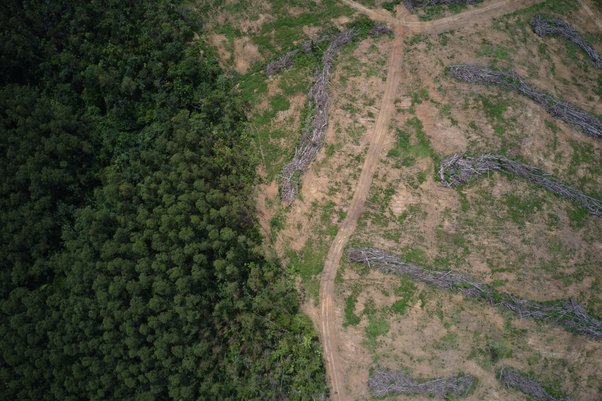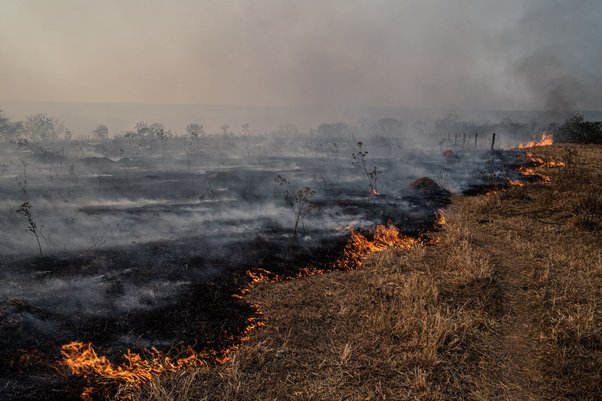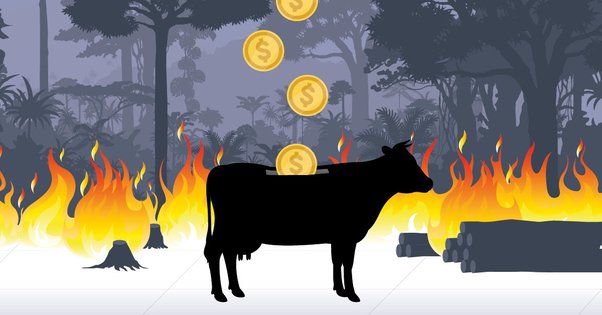Three of the world’s largest central banks stand accused of investing in the destruction of climate-critical forests in Brazil, according to a new investigation published today.
In recent years, the US Federal Reserve, the European Central Bank, and the Bank of England have sought to inject additional liquidity into financial markets by purchasing corporate bonds, a tool used extensively to support economies during the pandemic.
But analysis of these ‘asset purchase programmes’ shows that each institution has bought bonds in recent years from corporations heavily linked to illegal deforestation of climate critical forests and land grabs in Brazil. The new investigation from Global Witness, entitled Bankrolling Destruction reveals that:
- The US Federal Reserve has bought a combined total of $16 million of bonds issued by the Archer-Daniels-Midland Company (ADM), Bunge Ltd Financial Corp, and Cargill, Inc. since 2020, all companies accused of involvement in environmentally destructive activity in Brazil; and
- Since 2016, the Bank of England has also purchased an undisclosed share in a £150 million corporate bond issued by Cargill, Inc., and the European Central Bank has bought an undisclosed amount of debt issued by Bunge Finance Europe B.V.
All this comes despite the repeated public statements from all three central banks stressing the risks that climate change poses to financial stability and long-term economic growth.
Global Witness is calling for central banks to adopt zero-deforestation policies and avoid such purchases in future.
ADM, Bunge, and Cargill have denied some of the allegations of their links to deforestation. None of the central banks disputed the allegations and did not comment on Global Witness’s concerns regarding deforestation.
Veronica Oakeshott, Forest Team Leader at Global Witness, said:
“At a time when the climate crisis is ravaging countries across the world, it is unacceptable that the biggest central banks are investing in companies linked to the destruction of forests and its associated human rights abuses. If we are to have any hope of limiting climate change we need those forests standing. Whatever their corporate bond purchase schemes were set up for, it surely wasn’t this.”
“It also sets the worst possible example for other banks and investors in the US, Europe and Britain, and it betrays the mission that all three central banks have to act in the wider public good, especially when they are spending the central reserves that they control on our behalf.”
“Whilst the UK and US have either sold these bonds or are in the process of doing so they should now commit to avoiding such purchases in future and the European Central Bank needs to act to clean up its portfolio. These central banks have started to talk in recent years about the risks that climate change poses to stability and growth in the biggest economies, but all that talk will remain pure hypocrisy as long as their investments are directly contributing to those risks.”
Notes to editor:
The report found the Bank of England (BoE) purchased an undisclosed portion of a £150 million Cargill bond after the Corporate Bond Purchase Scheme’s creation in 2016. Cargill has been repeatedly tied to allegations of deforestation, land-grabbing, human rights abuses and of lobbying to weaken no deforestation regulatory proposals in the EU, by environmental organisations like Rainforest Action Network, Greenpeace’s Unearthed and Global Witness. Cargill responded to each allegation variously denying them or stating it was committed to ending deforestation in its supply chains and had acted on those pledges. The BoE responded stating they had made public pledges on climate change. For full responses see the report.
The Federal Reserve purchased $16 million in corporate debt from a range of controversial agribusiness traders including ADM; Bunge Ltd. Financial Corp, which is wholly owned by Bunge Ltd.; and Cargill. Two Global Witness reports found that ADM and Bunge were linked to human and environmental abuses in the tropical forested countries of Indonesia and Brazil. Both companies responded to the various allegations, either denying them, or launching investigations into them and referring Global Witness to public commitments they had made. For full responses please read the report. The Federal Reserve referred Global Witness to an FAQ describing the terms of eligibility for companies to participate in its bond purchasing program, which is silent on both deforestation risk and climate risk more broadly.
The European Central Bank’s Corporate Sector Purchase Programme, created in 2016, invested in debt issued by Bunge Finance Europe B.V., also a wholly-owned subsidiary of Bunge Limited. Reached for comment, an ECB spokesperson said, “[T]he Eurosystem does not publish a detailed breakdown of its corporate bond holdings by issuer. Such disclosure could compromise the effectiveness of monetary policy and impair the ECB’s ability to pursue its primary objective of price stability. However, the Eurosystem remains committed to being as transparent as possible. It will therefore continue to publish breakdowns by country, rating and industry sector every six months.” The bank did not address Global Witness’s concerns regarding deforestation.
According to research by the Sovereign Wealth Fund Institute, a professional subscription-based investor platform, the Federal Reserve ranks top by total assets held, with the Bank of England at number 7 and the European Central Bank at number 11.
In 2017, eight central banks and supervisors founded the Network for Greening the Financial System (NGFS) to mobilise climate finance and develop new risk assessment and supervision methodologies. Now boasting over 116 members, in March 2022, NGFS research highlighted deforestation an issue of ‘particular concern’ for financial stability risks emanating from biodiversity loss. Yet despite this, deforestation is still missing in action from the central banking agenda. Please read the report for more.


